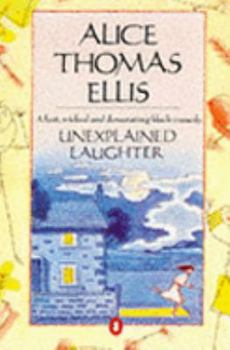Unexplained Laughter
Select Format
Select Condition 
Book Overview
In this short, wickedly funny and highly original novel, damnation, mayhem, and mysterious laughter abound from the moment Lydia, a flamboyant journalist, arrives at her Welsh country cottage to get... This description may be from another edition of this product.
Format:Paperback
Language:English
ISBN:014009203X
ISBN13:9780140092035
Release Date:January 1986
Publisher:Penguin Books Canada, Limited
Weight:0.25 lbs.
Dimensions:7.8" x 0.3" x 5.0"
Customer Reviews
2 ratings
"She didn't know where she belonged."
Published by Thriftbooks.com User , 20 years ago
In the novel "Unexplained Laughter" by Alice Thomas Ellis, sophisticated freelance journalist, Lydia decides to retreat to her remote country cottage in Wales. She abandons her usual witty circle of friends and "unhinged with the shock of bereavement, and further undone by wine" invites Betty to join her on holiday. Betty is not Lydia's typical sort of companion--Betty is practical, but dull--and she serves as a sort of living, walking conscience for Lydia. By the end of first evening with Betty, Lydia finds herself why on earth she invited this person. Betty drives Lydia to commit rare acts of niceness--ordinarily "behaving badly made Lydia feel better."One of the things I enjoyed most about this gently humorous novel was the delightfully refreshing Lydia. Lydia states that she always attends 'tribal events' and she mainly manages to hold herself in check at the various social events she attends. Lydia meets a perfectly awful couple--the Molesworths at a 'party' at Hywel's house, and she is thrust into the company of April, their sullen, jealous daughter. Lydia accepts that observation of peculiar and unpleasant people can be a sort of entertainment, and so she mingles with people she has little in common with. Events which occur during Lydia's holiday cause her to question the nature of good and evil, but unsettling experiences ultimately lead to a sense of acceptance. "Unexplained Laughter" is the most enjoyable book I've read in ages, and I recommend it wholeheartedly--displacedhuman.
"Laughter and evil can't co-exist. Nothing's funny in Hell."
Published by Thriftbooks.com User , 20 years ago
In a weak moment, sardonic journalist Lydia, recovering from a faithless lover, invites an emotionally needy acquaintance, to accompany her to a primitive cottage in rural Wales. Never particularly fond of Betty, "the human equivalent of sackcloth and ashes," Lydia finds herself alternating between resentment of Betty's good sense and optimistic outlook, and toleration of her desire to be helpful and, not incidentally, do the cooking. The two women have decidedly different temperaments, with Lydia often cynical, worldly, and full of snide comments, while Betty is honest, direct, and patient. Their conversations, often hilariously ironic dialogues, show two people who have nothing in common, stuck with each other for a vacation and toughing it out.Hywel, a dour farmer; Elizabeth, his fearful wife (with a secret lover); Beuno, Hywel's brother, who is studying to be a priest; and randy Doctor Wyn provide Lydia and Betty with their only real social life--a dull dinner party given by Elizabeth, visits by Beuno (whom Lydia regards as "one of her own kind") to discuss philosophy, trips to the Fair and to a concert, walks in the countryside, and eventually a grand finale of a picnic, all of which offer a marked contrast to Lydia's lively, intellectual life in the city. In brief dramatic interludes, interjected throughout the narrative, Hywel's sister Angharad, a deformed and mute "free spirit" (or demon) who roams the countryside, comments poetically on what she observes of these people and their behavior when she looks through windows and eavesdrops on conversations in the woods. Drawn to nature instinctively, she notes the contrasts between human nature and the life she sees in the woods and countryside. "If the land was a graven image, then Angharad was its priestess." Mysterious, "unexplained laughter," heard only by Lydia, adds mystical overtones to the novel, though the laughter is usually associated with observations made by Angharad. Gradually, Lydia begins to learn more about man and nature, love and betrayal, and good and evil, especially the nature of Satan, whom she calls by the much less threatening name of "Stan." Dry, ironic humor contrasts with genuine sadness, and cynicism with sensitivity here, as Lydia's farcical intrusions into the country life lead her to new understandings and a greater appreciation of the real world. Mary Whipple




